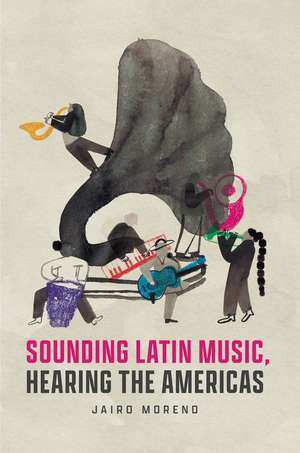Sounding Latin Music, Hearing the Americas: Big Issues in Music
Autor Jairo Morenoen Limba Engleză Paperback – 16 mai 2023
Many in the United States believe Latin American musicians make “Latin music”—which carries with it a whole host of assumptions, definitions, and contradictions. In their own countries, these expatriate musicians might generate immense national pride or trigger suspicions of “national betrayals.” The making, sounding, and hearing of “Latin music” brings into being the complex array of concepts that constitute “Latin Americanism”—its fissures and paradoxes, but also its universal aspirations. Taking as its center musicians from or with declared roots in Latin America, Jairo Moreno presents us with an innovative analysis of how and why music emerges as a necessary but insufficient shorthand for defining and understanding Latin American, Latinx, and American experiences of modernity.
This close look at the growth of music-making by Latin American and Spanish-speaking musicians in the United States at the turn of the twenty-first century reveals diverging understandings of music’s social and political possibilities for participation and belonging. Through the stories of musicians—Rubén Blades, Shakira, Arturo O’Farrill and the Afro-Latin Jazz Orchestra, and Miguel Zenón—Sounding Latin Music, Hearing the Americas traces how artists use music to produce worlds and senses of the world at the ever-transforming conjunction of Latin America and the United States.
| Toate formatele și edițiile | Preț | Express |
|---|---|---|
| Paperback (1) | 216.81 lei 3-5 săpt. | +21.10 lei 4-10 zile |
| University of Chicago Press – 16 mai 2023 | 216.81 lei 3-5 săpt. | +21.10 lei 4-10 zile |
| Hardback (1) | 619.15 lei 6-8 săpt. | |
| University of Chicago Press – 2 iun 2023 | 619.15 lei 6-8 săpt. |
Preț: 216.81 lei
Nou
Puncte Express: 325
Preț estimativ în valută:
41.50€ • 45.09$ • 34.88£
41.50€ • 45.09$ • 34.88£
Carte disponibilă
Livrare economică 01-15 aprilie
Livrare express 15-21 martie pentru 31.09 lei
Preluare comenzi: 021 569.72.76
Specificații
ISBN-13: 9780226825687
ISBN-10: 022682568X
Pagini: 416
Ilustrații: 16 line drawings, 2 tables
Dimensiuni: 152 x 229 x 25 mm
Greutate: 0.55 kg
Ediția:1
Editura: University of Chicago Press
Colecția University of Chicago Press
Seria Big Issues in Music
ISBN-10: 022682568X
Pagini: 416
Ilustrații: 16 line drawings, 2 tables
Dimensiuni: 152 x 229 x 25 mm
Greutate: 0.55 kg
Ediția:1
Editura: University of Chicago Press
Colecția University of Chicago Press
Seria Big Issues in Music
Notă biografică
Jairo Moreno is associate professor of music at the University of Pennsylvania. He is the author of Musical Representations, Subjects, and Objects and coeditor of Econophonia: Music, Value, and the Forms of Life.
Cuprins
Preface
Introduction
1 Reckoning with Letters: “Pedro Navaja” and Aural Equality
2 Crossing Under (and Beyond)
3 Shakira’s Cosmopolitanisms
4 Histories and Economies of Afro-Latin Jazz
5 Act, Event, and Tradition: Miguel Zenón and the Aurality of the Unthinkable
Conclusion
Acknowledgments
Notes
Bibliography
Index
Introduction
1 Reckoning with Letters: “Pedro Navaja” and Aural Equality
2 Crossing Under (and Beyond)
3 Shakira’s Cosmopolitanisms
4 Histories and Economies of Afro-Latin Jazz
5 Act, Event, and Tradition: Miguel Zenón and the Aurality of the Unthinkable
Conclusion
Acknowledgments
Notes
Bibliography
Index
Recenzii
“Original and insightful, Sounding Latin Music, Hearing the Americas is carefully researched in terms of historical framework, painstakingly structured and argued, and well written. Though the author's expertise is primarily musicological, his erudition spans several fields, and allows him to cover theoretical, historical, and disciplinary terrain that most scholars would be well advised not to attempt. In short, no one else could have written this tour de force.”
“This is a powerful, insightful, and enlightening book by a major thinker in his field with an impressive command of the literature and musical repertoire of Latin America as well as Latinos in the United States. Moreno writes consciously as an intellectual ‘migrant’ at the crossroads of music studies, Latin American studies, cultural studies, and American studies. The theoretical contributions of this book are palpable, and it is humanized by the author being so conversant in popular music for mass audiences.”



